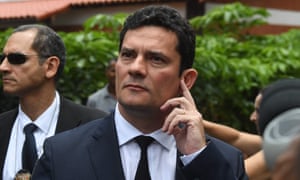Bolsonaro appoints judge who helped jail Lula to lead justice ministry
Sérgio Moro, who led ‘Car Wash’ investigation that jailed ex-president, accepts offer from president-elect
The corruption-busting Brazilian judge who helped pave the way for Jair Bolsonaro’s stunning electoral win on Sunday by jailing his main rival has accepted a position in the far-right president’s government.
In a highly controversial move, Bolsonaro announced that Sérgio Moro, who became a celebrity in Brazil thanks to his role spearheading the sprawling “Car Wash” corruption investigation, would be his justice and public security minister when he takes power in January.
“We will be guided by his anti-corruption and anti-organized crime agenda, as well as his respect for the constitution and the laws!” Bolsonaro tweetedto his 2.2 million followers to announce the move.
Bolsonaro’s invitation – and Moro’s decision to accept – caused immediate waves in Brazil.
Moro was responsible for jailing former Brazilian president Luiz Inácio Lula da Silva, who polls had suggested would have beaten Bolsonaro to the presidency but is instead now serving a 12-year sentence for corruption and money laundering.
In a 2016 interview Moro told one Brazilian newspaper he would “never” go into politics. “I’m a justice man … not a politics man,” Moro said.
Gleisi Hoffman, the president of Lula’s Workers’ party (PT), denounced what she called “the fraud of the century”.
“Judge Sérgio Moro will be Minister of Justice in Jair Bolsonaro’s Government, who has only got elected because Lula was unfairly convicted and prevented from participating in the elections,” she tweeted in English.
In a second tweet Hoffman added: “He helped elect [Bolsonaro], now he’ll help him govern.”
The Brazilian journalist Eliane Brum tweeted: “This is indecent in so many different ways that we will need to find new words. For now, though, I’ll choose one: obscenity.”
Brian Winter, the editor-in-chief of Americas Quarterly, described the wisdom of Moro’s decision as questionable.
“Some people are going to use this to just destroy him – including some people who were previous fans of his. It’s unavoidable. The narrative of a judge who jailed Lula and then took a job in his opponent’s government will be too compelling for some people to resist. And I suspect he knows that and I suspect he believes the benefits are greater than the risks.”
Monica de Bolle, the director of Latin American studies at Johns Hopkins University, said she was disappointed by Moro’s “troubling” decision.
“I think at the beginning ‘Car Wash’ was pure from political interference … [But Moro’s move] does send a message that … at some point it took a political turn – and it is going to be very hard not to believe in that.
“I don’t think Moro was intentionally persecuting the PT. But I do think the signal that ‘Car Wash’ at some point did become political is very unfortunate,” De Bolle added.
Winter, who knows Moro, said he was both “heartbroken and encouraged” by his decision.
“Heartbroken because I think it does irretrievably rewrite the history of ‘Car Wash’ and gives tremendous ammunition to people who believed it was a partisan crusade all along. I also think it poses tremendous risks to Moro personally because of Bolsonaro’s authoritarian tendencies and the risk that he will seek to trample institutions once in office.”
“I’m encouraged because I think that Moro will defend the independence of the judiciary [and] seek to change policy in order to nationalize the anti-corruption fight that he led … This is a big promotion for him and it gives him the ability to make actual policy changes that will strengthen the enforcement against corruption in Brazil.”
In a statement Moro said: “The prospect of implementing strong policies against corruption and organized crime, while respecting the constitution, the law and rights, lead me to this decision.”
Moro said he believed in his new role he would be able to “consolidate the advances against crime and corruption we have achieved in the last few years and reduce the risks of steps backwards, for a greater good”.
Moro, who at 46 will now become one of Brazil’s most powerful men, shot to fame three years ago for his central role in investigating what some have called the world’s biggest corruption scandal.
In July 2017 Moro handed Lula – Brazil’s president from 2003 until 2011 – a nine-year prison sentence after he was found guilty on corruption and money-laundering charges stemming from that inquiry.
Lula’s sentence was subsequently increased to 12 years and he was jailed in April this year with supporters labelling the former president a political prisoner. Forced from the presidential race, Lula was replaced by Fernando Haddad, a little-known former São Paulo mayor, who lost to Bolsonaro last Sunday by more than 10m votes.
“I believe in Sérgio Moro. I know Sérgio Moro. But his decision today makes him much more difficult to defend politically,” Winter said.

Nenhum comentário:
Postar um comentário